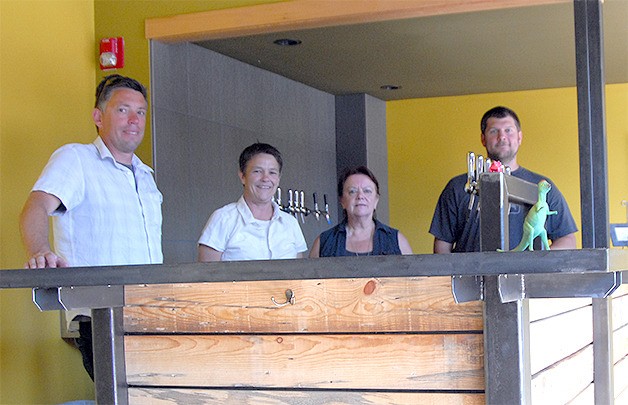Sleek blends with rustic in the Piccola Cellars new tasting room in North Bend. Warm gold walls, a polished concrete floor and steel light fixtures, give the place a modern edge, while the unfinished planks in the bar, plain picnic tables and, on warm days, the open garage doors, create a homey feel.
It’s a good look for a business that combines new technology, an old idea, and an ancient tradition.
Piccola Cellars is in the draft wine business, selling a variety of reds and whites by the keg to restaurants, and by the glass or refillable growler at its two tasting rooms in Woodinville and North Bend. Wine is the ancient tradition, of course, dating back thousands of years, and the highest-quality stainless steel tap system is the new technology. And the old idea? That was putting the two together, something that flopped in its last go-round, 40 years ago.
“There was a big wine on tap movement in the ‘70s, and it kind of got the reputation of being a low-quality wine,” says Piccola owner and founder Diana Kaspic. She suspects the wine was never the problem, and it was the tubing it was pumped through—a lower grade of stainless steel that was already being used for beer—that spoiled the wine.
“Almost all beers run through 303 stainless,” she said, “and beer doesn’t care—but wine reacts very poorly to other metals.”
Modern draft-wine systems use 304-grade stainless steel which Kaspic says is pure, leaving the wine “pristine,” pour after pour.
That consistency has been one of draft wine’s best selling points says Kaspic, in the five years since she started Piccola Cellars, at the Carnation Golf Course. Then, Piccola (“small” in Italian) was a distribution company, buying a product from wine-makers, then packaging it in kegs and selling it to restaurants. Kaspic, who’d previously worked for Washington Mutual, had started it as her final project for a quarter-long wine-professional intensive course at Central Washington University.
“Our final project was to come up with our own brand, a unique brand,” she explained.
She got an A on the project that has since become her career, and feels that her ability to identify opportunities is one of the strengths she lends to Piccola—“although I obviously had to be pretty good at sales!”
Selling a new wine system to vendors was a real challenge in the early days of the business, despite the advantages it offered. Besides the consistent quality, wine in kegs meant fewer glass bottles to recycle, fewer wines that went bad, and even a lower price point.
Now, with more than 100 regular customers including many Valley restaurants, she says, “Restaurants love it because their price per ounce for that quality of wine is lower—it never goes bad, it’s on the gas that preserves it and keeps it from oxidizing. Customers love it because every glass is fresh.”
Sales have become easier, too, as more companies began distributing wine in kegs. Some potential customers worry about not having the space for the system, Kaspic said, but she points out that a keg holds the equivalent of 26 bottles of wine, taking up the same or less space than that many glass bottles would. The cost of the system is business’ other common concern, and Kaspic said if they don’t already have the wine draft system, “it is an investment, but they make it back pretty quickly in what they don’t throw away.”
There’s another misconception—this one, about wine in general—that Kaspic wants to counter with her company. It’s the idea that wine is a fancy, special-occasions-only drink, which also started in the 70s.
“The industry almost became too formal, just really structured and pretentious,” she said. “It kind of got away from our roots of ‘Hey, this is great stuff, we should drink it with every single meal!’”
The wines of Piccola are those every-day wines.
“They’re not meant to sit around and age, so they do tend to be a little fresher, a little lighter in alcohol,” Kaspic said. “I think we have one wine that’s over 14 percent.”
Bottles and bottled wines will always have a place, though, she adds. “Some of the higher quality wines that are meant to age, they should be put in a bottle and they should be corked, because then they’ll continue to change and evolve,” she said. “All of our wines, if they’re going to do any changing or evolving, it’s going to happen in the tank.”
The industry will continue to grow, she predicts.
“The timing is perfect in a way, because this is the perfect vehicle for presenting wine to folks,” she said.
It’s similar to what happened in craft beers, she said. Until the past decade or so, most beer was bottled or canned, and very little was available on tap. “Now when you go into a bar, you might see 20 taps, and there’s three different IPAs. It’s not going to be long before you go into a wine bar and there’s 20 taps, and three of them are going to be Malbecs. One is going to be from Washington state, one is going to be from Argentina, and one will be from France.”
Piccola Cellars is located next door to North Bend City Hall, in the former fire station. The tasting room is open from 4 to 8 p.m. Tuesday through Friday, 2 to 8 p.m. Saturday and noon to 6 p.m. Sunday. Bring in a receipt from a North Bend business the same day and get $1 off a glass of wine. Learn more at http://piccolawine.com.

Piccola Cellars ‘ tasting room gives locals a chance to try the wines they make, and sell to restaurants in keg form. Bring a North Bend receipt and get a discount.




